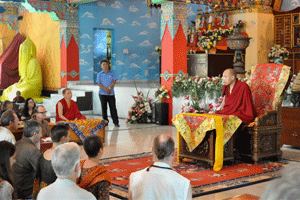October 27,2011- Tergar Monastery Bodhgaya.
 This morning His Holiness the 17th Gyalwang Karmapa gave a teaching on Compassion in the main shrine hall of Tergar Monastery at the request of Tsoknyi Rinpoche and Chokyi Nyima Rinpoche, here on pilgrimages with some 150 students from all over the world.
This morning His Holiness the 17th Gyalwang Karmapa gave a teaching on Compassion in the main shrine hall of Tergar Monastery at the request of Tsoknyi Rinpoche and Chokyi Nyima Rinpoche, here on pilgrimages with some 150 students from all over the world.
Chokyi Nyima Rinpoche’s translator acted as translator.
The veranda around Tergar gompa was filled with happy dharma practitioners, representative of many western countries, in anticipation of the teaching on this sunny morning. They slowly filed into the beautiful gompa and settled themselves into the peaceful silence.
His Holiness opened the teaching by playfully complaining that although this was meant to be a “secret holiday” in Bodh Gaya, he was now being given “lots of jobs to do”.
He then went on to explain that the root of bodhicitta is compassion. He stated that we cannot solve the problems of suffering in this modern age through technologies nor techniques. Suffering comes from within, from ego clinging. We focus on “me and mine”, constructing a boundary which separates what we consider to be ourselves, our families and friends, and our things on the inside, and on the outside, all that we see to be opposed to “me and mine”. From the inside, we feel safe and well. However, there is no “me”.
Compassion is about breaking down this boundary and sense of separation. We actually live in a vast network of relationships in which all are interdependent with one another. This is in accordance with the natural state of being. Today, because of the internet and global on-line communities, one person can have an impact, however.
He explained that we need to have a balance in our view of compassion between ourselves and others. Until that time when we are established as bodhisattvas, we cannot just think of others without taking care of ourselves.
We should be mindful of when we are experiencing happiness and suffering and how that feels, and then remember that all sentient beings wish to experience happiness and not to experience suffering.
As human beings, unlike other sentient beings, we all have the capacity to plan the future. We must be mindful of the impact of our decisions on other sentient beings – bringing them either happiness or suffering. For example, meat may seem like just a food for our enjoyment, but we should remember that this flesh we are eating was once the body of a sentient being.
Compassion is not just about kind acts; actually it is about being aware of the suffering of other sentient beings from the view of the actual nature of things.
His Holiness concluded the teaching session by giving mantra transmissions: the mantra of Shakyamuni Buddha, Tara, Guru Rinpoche and Chenrezig, before blessing each person individually. As the audience calmly left the shrine room, khatas around their necks, their faces shone with joy.
Kagyu Office wishes to thank Stefanie Selden, Sherry Wiggins and Karma Rinchen Dolma for making this available.


